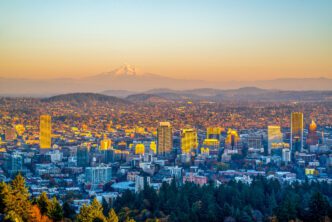Executive Summary
The Story So Far
Why This Matters
Who Thinks What?
The Trump administration secured a legal victory on Monday when a federal appeals court overturned a lower court’s order that had blocked the deployment of the Oregon National Guard to Portland. While the Ninth Circuit Court of Appeals’ 2-1 ruling supports the President’s authority to mobilize troops, a second temporary restraining order remains in effect, preventing immediate deployment and signaling further legal challenges.
Legal Hurdle Remains for Deployment
The appeals court’s decision only rescinds one of two lower court orders that had halted the National Guard’s mobilization. Consequently, troops cannot be deployed until the second restraining order, which broadly blocks the administration from mobilizing National Guard troops from anywhere in the U.S. into Oregon, is also overturned.
The administration has since filed a request arguing that the second order should also be overruled, given its reliance on the same legal reasoning as the first. Oregon Governor Tina Kotek expressed concern that hundreds of National Guard troops are in a “holding pattern” away from their homes and jobs, citing a lack of communication from the Trump administration regarding potential deployment timelines or troop numbers.
Potential for Further Appeals
The appellate panel’s decision included a dissenting vote from Judge Susan P. Graber, who argued that the ruling erodes core constitutional principles, including states’ control over their militias and First Amendment rights. Oregon Attorney General Dan Rayfield echoed these sentiments, stating that the ruling, if upheld, would grant the President unilateral power to deploy Oregon soldiers with minimal justification.
Rayfield has requested an “en banc” review from the Ninth Circuit, which would involve a larger panel of 11 appellate judges reconsidering the case. A separate Ninth Circuit judge has also asked the court to vote on whether the case should be reheard en banc, with attorneys for both sides given until Wednesday midnight to submit their arguments.
Background on Portland Protests and Federal Response
Protests in Portland against White House immigration policies began in June, escalating to declared riots and arson arrests by mid-summer. President Trump announced in late September his intention to send 200 Oregon National Guard troops to the city, characterizing it as “war-ravaged” and uncontrollably violent.
Governor Kotek and other Oregon leaders have strongly disputed this characterization, asserting that the situation is not as extreme as federal officials portray. A bipartisan group of senators, including those from Oregon, sent a letter to the Defense Department Office of Inspector General requesting an inquiry into recent domestic deployments, citing concerns about military readiness, resources, and the constitutionality of such actions without state consent.
Broader Implications Across States
The legal battle in Oregon is part of a wider trend of the Trump administration seeking to deploy National Guard troops in various cities despite local and state opposition. Officials from Illinois and Chicago have asked the U.S. Supreme Court to block the administration’s emergency request to deploy National Guard troops there.
They argue that no protest activity in Illinois has hindered the execution of federal law and that local authorities can manage demonstrations effectively. In Tennessee, a group of elected officials has sued Governor Bill Lee for deploying the Tennessee National Guard to Memphis at the direction of Trump, contending that state law only permits such action in cases of rebellion or invasion, and only with legislative approval.
President Trump has also indicated intentions to send the National Guard to San Francisco, claiming the city “went wrong, went woke.” However, San Francisco Mayor Daniel Lurie and California Governor Gavin Newsom have publicly opposed such a deployment, with Mayor Lurie stating that the National Guard lacks the authority to arrest drug dealers and would not address the city’s challenges.
Key Takeaways
The Ninth Circuit’s ruling represents a significant, though partial, legal win for the Trump administration in its efforts to deploy the National Guard to Portland. However, ongoing legal challenges and strong opposition from state and local leaders highlight the contentious nature of these deployments and the constitutional questions they raise regarding federal versus state authority over military forces.








